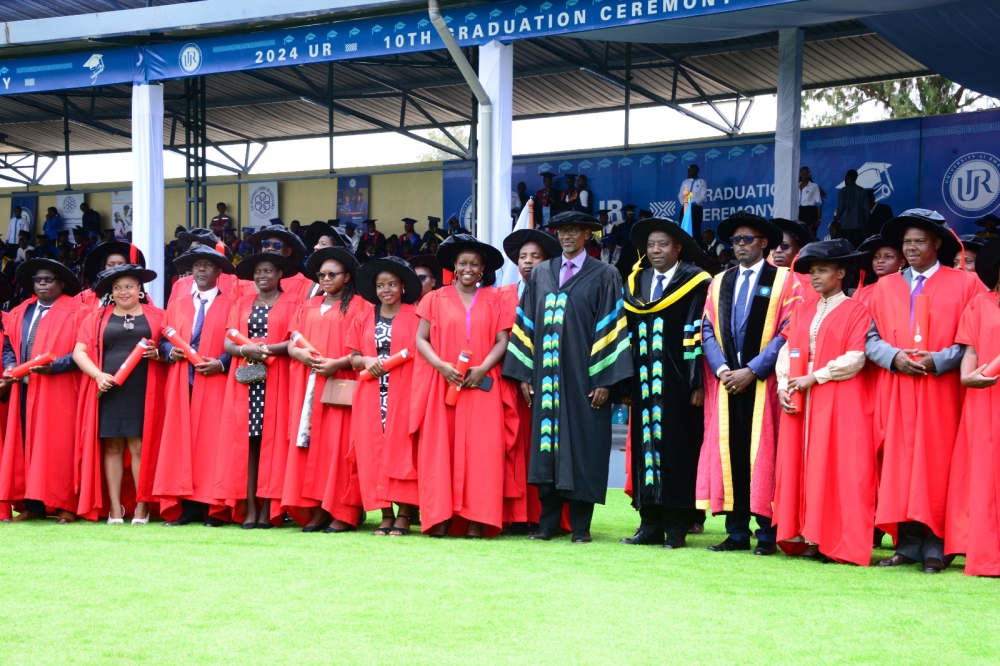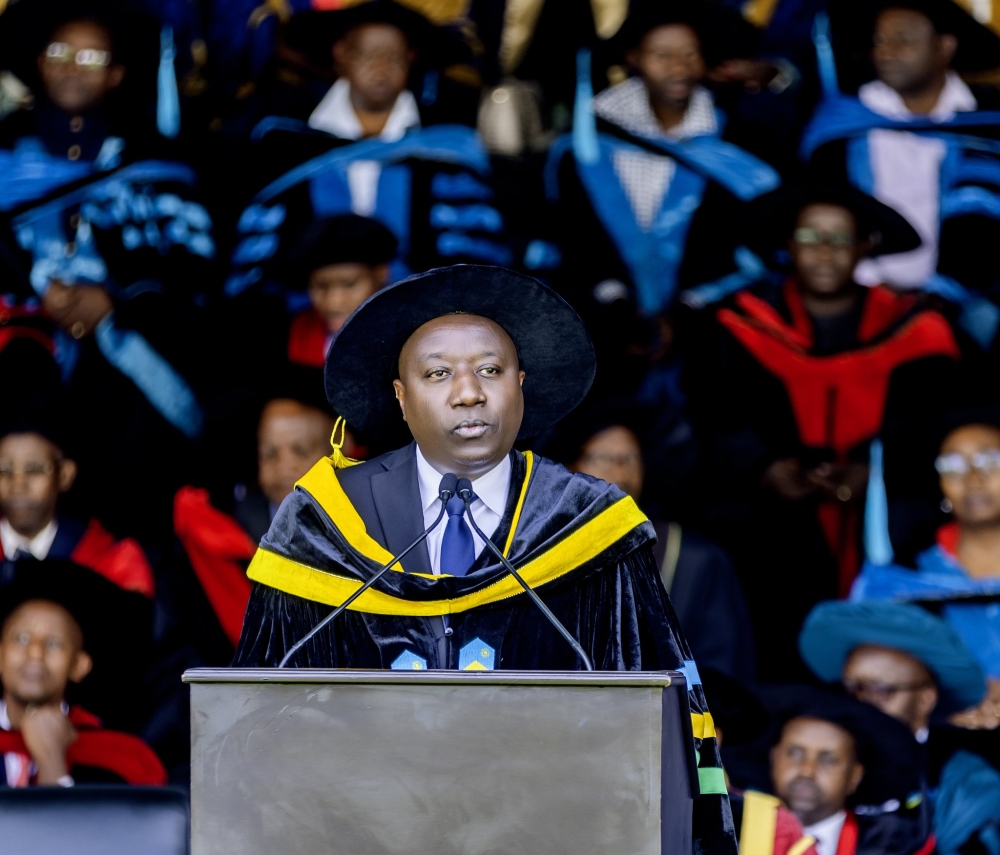

The University of Rwanda celebrated its 10th graduation ceremony at the Huye campus stadium, honouring a cohort of over 8,000 graduates, on October 25.
The event recognised the hard work and dedication of 8,068 students, 3,109 women, and 4,959 men, as they received degrees ranging from diplomas to PhDs.
Among the graduates, 6,657 earned Bachelor’s degrees, 946 Master’s degrees, and 148 diplomas, along with 247 advanced diplomas, three postgraduate diplomas, one postgraduate certificate, and 13 subspecialty certificates.
Among the graduates, 38 (12 PhDs and 26 Masters) were trained at the African Centre of Excellence in Internet of Things (ACEIoT) in embedded computing systems and wireless sensor networking programmes.
The ceremony was attended by high-level government officials, reflecting the significance of this milestone in the nation’s commitment to education and development.
Prime Minister Edouard Ngirente urged graduates to make a meaningful impact that will positively transform lives in the communities. He emphasised the need to uphold values of patriotism and integrity, think big, seek innovative development solutions, and undertake impactful projects that benefit both graduates and the country.
"You should always remember that the positive transformation of the country begins with you. I encourage you to save all the opportunities the country offers you. Remember that your success is linked with the development of our nation,” he noted.


Minister of Education, Joseph Nsengimana, commended the new graduates for reaching this significant milestone in their academic journey. He emphasised the critical role that the University of Rwanda plays in shaping the future of the nation and beyond.
"Today, we celebrate not only your achievements but also the potential you hold to drive sustainable and inclusive development, and as you step into this new chapter, you join a distinguished legacy of alumni who are making impactful contributions across various sectors; we count on you too,” he said.
Nsengimana highlighted that the university serves as more than just a place of learning; it is a dynamic incubator for talent, leadership, and innovation.
The Vice Chancellor of the University of Rwanda, Didas Kayihura Muganga, commended the graduates on their achievement, urging them to carry the spirit of the University of Rwanda with them, embracing the challenges and seeking growth opportunities.
"Remember that education is not just about personal advancement; it is about uplifting others and contributing to the greater good. I want to also remind you of the importance of humility in your future endeavours,” he said.
He added: "Your journey has not only equipped you with knowledge but also with values that will guide you as you step into the world.”
Professor Damien Hanyurwimfura, Director of the African Centre of Excellence in Internet of Things (ACEIoT), congratulated the graduates for their hard work and dedication, emphasising the importance of IoT in sectors such as agriculture, energy, health, climate change, and transportation.
"We hope for ongoing assistance to help us contribute more effectively to Rwandan education and to address market needs in Rwanda and beyond,” he said.
Hanyurwimfura encouraged graduates to take on important roles following their studies. He urged them to utilise their skills to provide solutions not only in Rwanda but across the African continent.
"I urge you to apply the skills and knowledge you have gained from the centre to provide IoT solutions that address African challenges, transfer your knowledge and skills to others, and become ambassadors of the centre by sharing your experiences and journeys. By doing so, you will motivate other interested applicants to join ACEIoT and benefit from what we offer.”
Hanyurwimfura congratulated Arthur Mwang’onda, a Malawian MSc graduate in Internet of Things with a focus on embedded computing systems, who was awarded as the best performer at the College of Science and Technology (CST). This shows how the centre provides all the necessary facilities and support to allow the students to perform well in their studies.
Theofrida Julius Maginga, a Tanzanian PhD graduate in the Internet of Things centred on embedded computing systems, expressed her gratitude for the opportunities provided by the African Centre of Excellence in IoT.
"Today marks the culmination of our hard work, and we are eager to give back to our communities by sharing the skills we've gained at the IoT centre. We believe these solutions will benefit individuals in Rwanda, Tanzania, and beyond.”
She highlighted the valuable skills acquired, particularly in developing affordable and accessible IoT devices for sectors such as agriculture and health. Maginga acknowledged that difficulties are part of the learning process and addressed the challenges she faced during her studies.
"While we encountered challenges that required resources and time, the teamwork at the African Centre of Excellence made the experience enriching. I look forward to applying these skills in future collaborations.”
Maginga emphasised the importance of integrating their research into everyday societal systems.
She said: "The way forward is to ensure that our solutions are adopted within formal systems, especially through partnerships with governments and communities.”
She is among four PhD graduates who have been sponsored by the Regional Scholarship Innovation Fund (RSIF), a flagship of the Partnership for Skills in Applied Sciences, Engineering and Technology (PASET) managed by the International Centre of Insect Physiology and Ecology (ICIPE).


